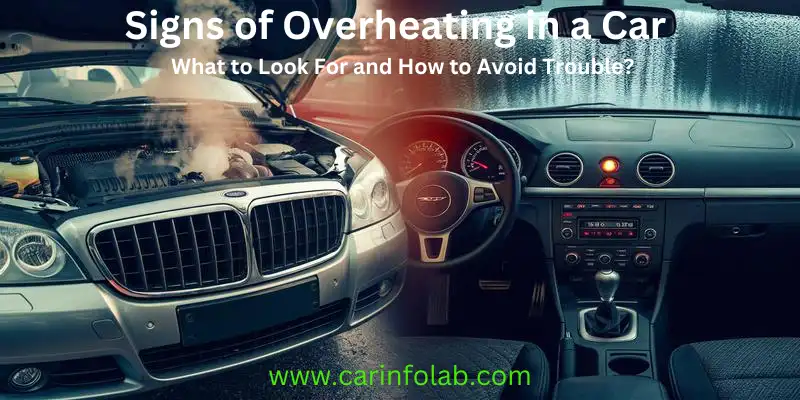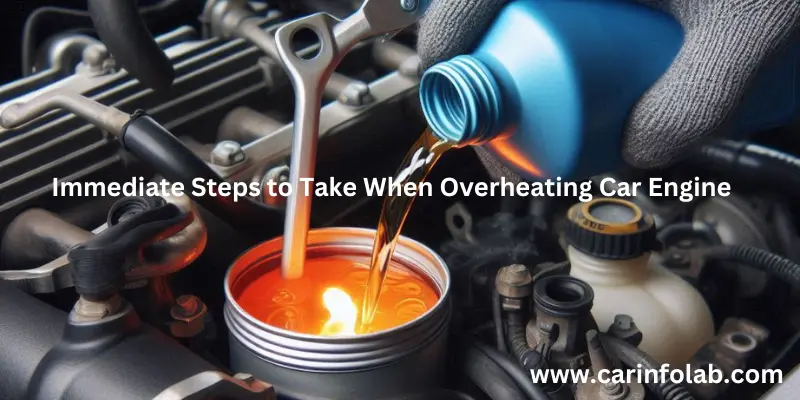Signs of Overheating in a Car: What to Look For and How to Avoid Trouble?
Updated: July 7, 2024
181
Have you ever been stuck in traffic and felt your car getting uncomfortably hot? That feeling isn’t just you; it could be your car overheating! Overheating in a Car may be stressful and threatening, but understanding the symptoms early permits you to avoid big troubles and live safely. Whether you have observed your car getting too warm in traffic or seen caution lights come on, knowing those symptoms is essential.
This guide covers everything from the primary signs and symptoms that your automobile might be overheating to what to do immediately if it occurs and clean ways to prevent it from happening in the first place. Whether riding to work or planning a trip, staying informed and prepared can ensure your travels are clean and worry-free.
What is Overheating in a Car?
Your car’s engine works hard, and it gets hot when it does. There’s a special system in your car to keep it cool, like a radiator. But sometimes, this cooling system might not work well. When that happens, the engine can get too hot, and that’s called overheating.
When your car gets too hot, it can hurt the engine. So, it’s important to listen to your car and look for signs of overheating, like the temperature light coming on.

Common Causes of Car Overheating
Here are some common causes of why cars overheating:
1. Coolant Issues
More coolant or coolant leaks reduce the system’s ability to regulate temperature.
2. Radiator Problems
A clogged or leaking radiator can’t effectively cool the engine.
3. Faulty Thermostat
A thermostat stuck in the closed position prevents coolant from flowing through the radiator.
“Understanding the signs of overheating in a car is not just about maintenance; it’s about ensuring safety on the road. This guide provides invaluable insights into recognizing and preventing such issues.”John Doe, Automotive Expert
4. Water Pump Failure
This vital component moves coolant through the system; its failure means no coolant circulation.
5. Blocked Hoses
Debris or wear can block hoses, disrupting coolant flow.
Signs of Overheating in a Car
Being alert to these signs can help you catch overheating before it causes severe damage:
1. Temperature Gauge Reads High
The temperature gauge on your dashboard is the first indicator. If it moves into the red zone or significantly increases, your car is overheating.
| Indicator | Description |
|---|---|
| Gauge Needle in the Red Zone | Indicates excessive engine temperature. |
| Rapid Needle Movement | Sudden or quick rise in the gauge needle. |
| Intermittent Fluctuations | The needle moves up and down irregularly. |
| Slow Return to Normal | The gauge takes time to return to normal after rising. |
| Consistently High Readings | The gauge remains high despite normal driving conditions. |
| Check Engine Light | It may accompany a high-temperature reading. |
| Temperature Warning Light | Illuminates specifically for overheating issues. |
2. Steam or Smoke from the Engine
Steam or white smoke under the hood usually indicates the coolant is boiling.
| Type | Description | Potential Causes | Recommended Actions |
|---|---|---|---|
| Steam | White vapor rises from the engine area. | – Coolant boiling due to overheating – Radiator leak | – Safely pull over and turn off the engine – Allow the engine to cool – Keep an eye on the level of coolant & any leaks. |
| White Smoke | Thick, white smoke, often with a sweet smell. | – Coolant leak into the engine – Blown head gasket | – Safely pull over and turn off the engine – Do not drive the vehicle – Have the engine inspected by a mechanic |
| Blue Smoke | Blue-tinted smoke, usually from the exhaust. | – Oil leaking into the combustion chamber – Worn piston rings or valve seals | – Safely pull over – Check oil levels – Seek professional repair |
| Black Smoke | Dark smoke from the exhaust. | – Rich fuel mixture – Clogged air filter – Faulty injectors | – Safely pull over – Inspect air filter – Have the fuel system checked |
3. Strange Smells
A burning smell could indicate engine parts overheating, while a sweet smell suggests a coolant leak.
| Smell | Possible Cause | Immediate Action |
|---|---|---|
| Burning Rubber | Potentially from overheated drive belts or hoses. | Check belts and hoses for damage or slippage. |
| Sweet Syrupy Smell | Usually indicates a coolant leak. | Inspect for coolant leaks and refill if needed. |
| Burning Oil | It could be from oil leaking onto hot engine parts. | Check for oil leaks and top up engine oil. |
| Hot Metal | Overheating of metal components due to lack of lubrication or coolant. | Check oil and coolant levels and inspect the engine. |
4. Engine Power Loss
Overheating can cause the engine to lose power or perform poorly.
| Symptom | Description | Causes | Actions to Take |
|---|---|---|---|
| Reduced Acceleration | Sluggish or unresponsive acceleration when pressing the gas pedal. | – Overheated engine components – Coolant system issues | – Safely pull over – Turn off the engine – Let it cool |
| Stalling or Shutting Down | Engine stops running while driving or idling. | – Severe overheating – Possible sensor failure | – Do not restart immediately – Check the coolant level – Contact a mechanic if persistent |
| Rough Idle | The engine runs unevenly or shakes when idling. | – Heat affecting ignition or fuel system | – Inspect coolant and oil levels – Seek professional inspection |
| Warning Lights | Dashboard lights such as “Check Engine” or “Temperature” illuminate. | – Overheating triggers safety measures | – Pull over and check engine temperature – Follow vehicle manual guidelines |
| Unusual Engine Noises | Tapping, knocking, or pinging sounds from the engine. | – Metal parts expanding or coolant system issues | – Safely stop the vehicle – Avoid driving until checked by a professional |
5. Unusual Noises
It sounds like boiling or knocking might indicate overheating.
| Noise | Possible Cause | Action to Take |
|---|---|---|
| Boiling or gurgling sound | Coolant is boiling due to overheating. | Stop your car in a safe place and let the engine get cooler. Check coolant levels after cooling. |
| Knocking or pinging | Engine parts expand rapidly due to heat. | Turn off the car and wait for it to get cold. Have a mechanic inspect for damage. |
6. Warning Lights on Dashboard
Modern cars have sensors that trigger warning lights when overheating is detected.
| Dashboard Warning Light | Meaning | Action |
|---|---|---|
| Engine Temperature Light | Indicates that the engine temperature is too high. | Stop the car safely and turn it off. |
| Coolant Warning Light | Indicates low coolant levels or overheating. | Park the car and verify the water status. |
| Check Engine Light | This may indicate various engine issues, including overheating. | Pull over and check engine temperature. |
| Oil Pressure Light | Low oil pressure can cause overheating. | Stop the car immediately and check the oil levels. |
Immediate Steps for Signs of Overheating in a Car
Follow the given steps if you notice your car is overheating:
1. Safely Pull Over
You should pull over as quickly as possible because it’s safe to avoid further damage.
2. Turn off the Engine
The most important step is to turn off your engine. This will stop it from getting hotter.
3. Let the Engine Cool
The radiator gets super hot when the engine is running. Before opening the cap, wait until everything cools down, or you could get burned.

4. Check Coolant Levels
Once the engine has completely cooled down (at least 30 minutes), it is safe to check the coolant level. If it is low, add more coolant following your car’s manual instructions.
5. Look for Visible Leaks
Check the coolant hoses and tank for any tears, cracks, or loose connections.
Preventive Measures to Avoid Car Overheating
The key to stopping your car from overheating is doing some routine checkups and looking for problems
| Avoid Car Overheating Tips |
|---|
|
If you ignore your car overheating, it can turn into a big headache. By recognizing the signs and symptoms early and performing everyday renovation, you can keep your car in top operating condition and avoid costly upkeep.
“One of the simplest yet effective ways to prevent car overheating is to regularly check your coolant levels. It’s a quick check that can save you from a lot of headaches.”Robert Brown, Auto Repair Specialist
If you encounter persistent overheating troubles, seek advice from a professional mechanic to ensure your car’s cooling system is functioning successfully.
Conclusion
Car overheating may be a demanding activity, but being capable of recognizing the signs early permits you to keep away from fundamental issues and ensure your protection on the road. Whether you’ve observed your car heating up in traffic or seen warning lighting fixtures in your dashboard, expertise in these signs is critical. This comprehensive guide includes the initial signs and symptoms of overheating, immediate actions to take, and suggestions for stopping overheating altogether.
By staying informed and proactive, you can preserve your automobile, go for walks smoothly, and enjoy fear-free travels, whether it’s your day-by-day commute or a long-awaited avenue experience.
FAQs
How do you recognize if your engine has overheated?
Your vehicle will provide you with some clues if it’s overheating. Look for a temperature gauge reaching the hot area (pink), steam from beneath the hood, or a burning odor. If you note any of those, pull over competently and turn off the engine.
Can I still drive my car if it overheated?
No! Driving an overheated car can cause major damage. Call for roadside assistance or a tow truck.
How can I prevent my car from overheating?
Regular maintenance is key! Get coolant levels checked and flushed, keep the radiator clean, and schedule checkups to ensure your cooling system works properly.
Is it safe to open the radiator cap while the engine is hot?
Absolutely not! The coolant can scald hot and spray you. Let the engine cool completely before opening the radiator.
Can low engine oil cause overheating?
Yes, engine oil helps lubricate moving parts and reduce friction. The engine can work harder and generate more heat without proper oil levels.
Can I use any type of antifreeze in my car?
No, different coolants have different properties. Consult your owner’s manual for your car’s recommended type of coolant.
Please Write Your Comments